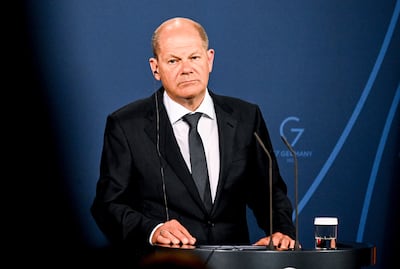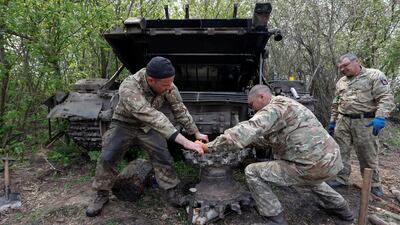Live updates: follow the latest news on Russia-Ukraine
Germany’s response to the war in Ukraine shows it can no longer be relied on to deliver leadership in Europe, a think tank heard.
German Chancellor Olaf Scholz has been criticised at home and abroad over his reluctance to provide heavy weapons to help Ukraine resist Russia’s invasion.
The Bundestag last week approved a petition to deliver heavy arms to the former Soviet nation, marking a historic shift in Berlin’s position. But the move only came after Mr Scholz was accused of being aloof in the face of a raging war in Europe.
The government’s response to the Russian invasion means Europe’s biggest economy is not projecting leadership qualities, said Kataryna Wolczuk, a professor of politics and a fellow at Chatham House.
“What is interesting about waiting for Germany’s leadership, there was a lot of coverage of Germany about what was happening and a lot of frustration and anger, what is interesting now [is] that central Europe doesn’t expect too much from Germany.
“They’ve realised that actually they need to, in terms of rhetoric and actions, show leadership and Germany is the country which follows, when everybody does this.”
She added that “it’s a kind of central European ‘maidan’ — the place where you see who is who and what can be achieved”, referencing the 2014 uprising in Ukraine.

She was speaking at an online event hosted by Chatham House, a London-based think tank, about how the Ukraine war is likely to affect Europe.
Relations between Berlin and Kyiv have suffered as a result of the German government’s reluctance to send arms to Ukraine.
However, Germany did say last week it would send anti-aircraft tanks to Ukraine and Mr Scholz also expressed support for last week’s motion passed by the German Parliament calling for the acceleration of the delivery of heavy weapons.
Kyiv last month snubbed German President Frank-Walter Steinmeier as he announced plans to visit the war zone, due to his previous attempts to cosy up to the Kremlin. He said he had offered to travel to the Ukrainian capital, but this was “not wanted in Kyiv”.
Mr Scholz has been criticised for his failure to visit Kyiv. Since Russian troops withdrew from towns and villages around the capital in early April, several western leaders, including the UK’s Boris Johnson, the European Commission’s Ursula von der Leyen and the heads of the Baltic countries, have visited.
Mr Steinmeier and Mr Scholz have been invited to Kyiv, the German president’s office said on Thursday.
Ukrainian President Volodymyr Zelenskyy extended the invitation during a phone call with Mr Steinmeier, a source from the president's office told AFP, during which “past irritations were cleared up”.
Mr Steinmeier expressed his “solidarity, respect and support” for Ukraine and said Germany “stands with united forces in solidarity at Ukraine's side”.
Both presidents described the talks as “very important and very good”, the source said.
Mr Steinmeier, a former foreign minister, has faced growing criticism since Russia invaded Ukraine for his years-long detente policy towards Moscow. Last month, he admitted the country should have been more cautious and sceptical in its previous policy towards Russia.
“We failed on many points,” the president told German public broadcaster ZDF. He added that Berlin should have heeded the warnings of the Eastern European nation, particularly after Russia’s annexation of Crimea in 2014.

























































